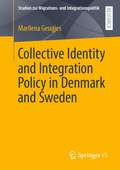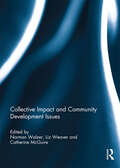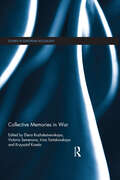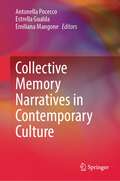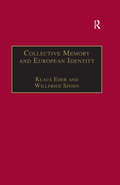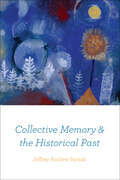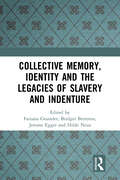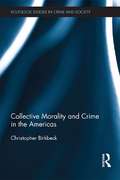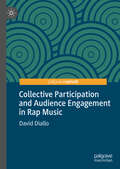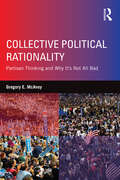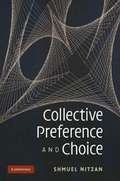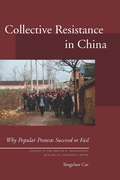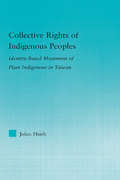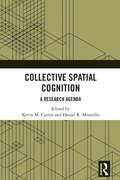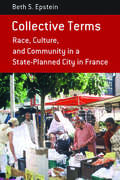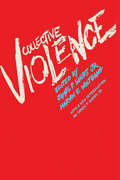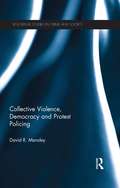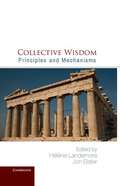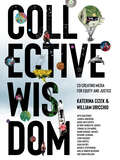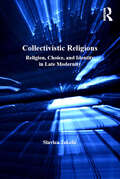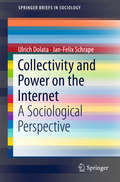- Table View
- List View
Collective Identity and Integration Policy in Denmark and Sweden (Studien zur Migrations- und Integrationspolitik)
by Marilena GeugjesThis book discusses the interrelationship between practices of collective self-interpretation, in this case national identity construction, and integration policies, using the example of Denmark and Sweden. Though both countries are considered to be socially progressive and modern, not least by themselves, the author makes the novel and provocative argument that both Denmark and Sweden are caught in a (discourse) paradox when it comes to integration policy, which stands in the way of successful immigrant integration. The author uses an innovative approach to reconstruct the Danish and the Swedish national identity by using social studies schoolbooks and novels as research material, thereby adding an interdisciplinary dimension to the book. About the author Marilena Geugjes is a postdoctoral researcher at the University of Applied Sciences in Wiesbaden, Germany. She earned her doctorate in Political Science at Heidelberg University. Her research focuses on migration and integration policy, local politics, and the role of the police.
Collective Impact and Community Development Issues (Community Development – Current Issues Series)
by Norman Walzer, Liz Weaver and Catherine McGuireCollective Impact is intended to help community leaders effectively engage participants in strategic planning initiatives and achieve desired results. It is a logical extension of, and builds on, earlier efforts that experienced difficulties helping groups implement actions identified in the planning processes. This book examines successful practices that apply Collective Impact principles to a variety of community development issues including reducing poverty, and similar topics. Contributing authors also examine techniques used in working with local groups to facilitate effective changes in their communities. The discussions focus on settings in which Collective Impact efforts are likely to succeed using a variety of case studies that vary by intent, purpose, and location. Discussions of involvement by community and campus partnerships, regional planning organizations, and other groups can affect the ways in which Collective Impact principles are applied and how well they work. The discussions conclude with transformational changes within Collective Impact, moving from the individual to the system and future directions for Collective Impact approaches. Practitioners and scholars alike will find the discussions of various approaches and outcomes using Collective Impact useful in designing future efforts to bring about community change.This book was originally published as a special issue of the journal Community Development.
Collective Memories in War (Studies in European Sociology)
by Elena Rozhdestvenskaya Victoria Semenova Irina Tartakovskaya Krzysztof KoselaThis edited collection offers an empirical exploration of social memory in the context of politics, war, identity and culture. With a substantive focus on Eastern Europe, it employs the methodologies of visual studies, content and discourse analysis, in-depth interviews and surveys to substantiate how memory narratives are composed and rewritten in changing ideological and political contexts. The book examines various historical events, including the Russian-Afghan war of 1979-89 and World War II, and considers public and local rituals, monuments and museums, textbook accounts, gender and the body. As such it provides a rich picture of post-socialist memory construction and function based in interdisciplinary memory studies.
Collective Memory Narratives in Contemporary Culture
by Emiliana Mangone Antonella Pocecco Estrella GualdaStarting from the central importance of memory in contemporary societies, this book encourages a transdisciplinary reflection on how the “presentification of the past” is never a simple reenactment but corresponds to the interaction between memory and cultural sensitiveness, present beliefs and needs, expectations, and forecasts for the future. It studies cultural (re)construction through collective stories, including academic debates, media narratives, collective mobilizations, state narratives of history, architectural reconstructions, and artistic expressions. It looks at how technological innovations have profoundly changed the practices of conservation and dissemination of collective memory, with particular reference to cultural digitization. Finally, it shows that the relevance and selection of events, the organization of connections and cross-references between past, present, and future, as well as the importance of diversified collective imaginaries are the keys to narrative constructions of memory that prove to be sensitive and decisive for its continuity and its intergenerational transmission. This interdisciplinary collection is for students and scholars of the social sciences, cultural studies, and the humanities interested in memory studies.
Collective Memory and European Identity: The Effects of Integration and Enlargement
by Willfried SpohnIs it possible to create a collective European identity? In this volume, leading scholars assess the link between collective identity construction in Europe and the multiple memory discourses that intervene in this construction process. The authors believe that the exposure of national collective memories to an enlarging communicative space within Europe affects the ways in which national memories are framed. Through this perspective, several case studies of East and West European memory discourses are presented. The first part of the volume elaborates how collective memory can be identified in the new Europe. The second part presents case studies on national memories and related collective identities in respect of European integration and its extension to the East. This timely work is the first to investigate collective identity construction on a pan-European scale and will be of interest to academics and postgraduate students of political sociology and European studies.
Collective Memory and the Historical Past
by Jeffrey Andrew BarashThere is one critical way we honor great tragedies: by never forgetting. Collective remembrance is as old as human society itself, serving as an important source of social cohesion, yet as Jeffrey Andrew Barash shows in this book, it has served novel roles in a modern era otherwise characterized by discontinuity and dislocation. Drawing on recent theoretical explorations of collective memory, he elaborates an important new philosophical basis for it, one that unveils important limitations to its scope in relation to the historical past. Crucial to Barash's analysis is a look at the radical transformations that the symbolic configurations of collective memory have undergone with the rise of new technologies of mass communication. He provocatively demonstrates how such technologies' capacity to simulate direct experience--especially via the image--actually makes more palpable collective memory's limitations and the opacity of the historical past, which always lies beyond the reach of living memory. Thwarting skepticism, however, he eventually looks to literature--specifically writers such as Marcel Proust, Walter Scott, and W. G. Sebald--to uncover subtle nuances of temporality that might offer inconspicuous emblems of a past historical reality.
Collective Memory, Identity and the Legacies of Slavery and Indenture
by Farzana GounderThe Caribbean history provides a rich study of the different forms of labour systems that have historically marked the politics of the coloniser and the colonised. It further provides the basis for an essential study for discourses on colonialism and capitalism. This interdisciplinary volume bridges the gap between historiography and the present-day diasporic communities, which emerged from the slave trade and indenture. Through case studies from the Caribbean context, the volume demonstrates how the region’s historical labour mobility remains central to performances and negotiations of collective memory and identity. Please note: Taylor & Francis does not sell or distribute the Hardback in India, Pakistan, Nepal, Bhutan, Bangladesh and Sri Lanka.
Collective Morality and Crime in the Americas (Routledge Studies in Crime and Society)
by Christopher BirkbeckThis study examines the ways in which the moral community is "talked into being" in relation to crime, and the objects of concern that typically occupy its attention. It maps the imagined moral universe of the virtuous and the criminal and charts the relations between these two groups in the "history of the present." It examines the calls to action which symbolically endow the moral community with power. And it looks at the character and content of collective moralizing. The source materials are commentaries about crime and criminal justice appearing in selected newspapers across the Americas. The moral "talk" found there is stylized, routine, trivial and occasionally dramatic. It looks nothing like the weightier renderings of morality that derive from the reconstruction of a particular "ethic" or from the systematic probing of values and moral reasoning. And its fuzzy, offhand, unexceptional and frequently unsystematic nature makes it a difficult candidate for explaining either stability or change in crime policies. But moral talk has intrinsic importance as the creator and sustainer of an imagined moral community, a community that symbolizes the existence and vigor of morality itself and confers a crucially important identity on its self-proclaimed members. And moral talk reveals inherent intersections between normative, empirical and technical discourses, highlighting the relationships between morality, science and social engineering. Thus, a prosaic, instrumental, model of morality is particularly strong in North America, but only found in a more abstract form in Latin America, where it sits alongside a stirring vision of morality, more directly anchored in virtue. Research on social problems, moral panics and the sociology of morality has largely overlooked the type of moral discourse studied here. While emphasizing the culturally contingent nature of the findings, the conclusion reflects on their significance for understanding the nature of moralizing, the artifacts of talk and the construction of identity.
Collective Participation and Audience Engagement in Rap Music (Pop Music, Culture and Identity)
by David DialloWhy do rap MCs present their studio recorded lyrics as “live and direct”? Why do they so insistently define abilities or actions, theirs or someone else’s, against a pre-existing signifier? This book examines the compositional practice of rap lyricists and offers compelling answers to these questions. Through a 40 year-span analysis of the music, it argues that whether through the privileging of chanted call-and-response phrases or through rhetorical strategies meant to assist in getting one’s listening audience open, the focus of the first rap MCs on community building and successful performer-audience cooperation has remained prevalent on rap records with lyrics and production techniques encouraging the listener to become physically and emotionally involved in recorded performances. Relating rap’s rhetorical strategy of posing inferences through intertextuality to early call-and-response routines and crowd-controlling techniques, this study emphasizes how the dynamic and collective elements from the stage performances and battles of the formative years of rap have remained relevant in the creative process behind this music. It contends that the customary use of identifiable references and similes by rap lyricists works as a fluid interchange designed to keep the listener involved in the performance. Like call-and-response in live performances, it involves a dynamic form of communication and places MCs in a position where they activate the shared knowledge of their audience, making sure that they “know what they mean,” thus transforming their mediated lyrics into a collective and engaging performance.
Collective Political Rationality: Partisan Thinking and Why It's Not All Bad
by Gregory E. McAvoyAmidst the polarization of contemporary politics, partisan loyalties among citizens are regarded as one contributor to political stalemate. Partisan loyalties lead Democrats and Republicans to look at the same economic information but to come to strikingly different conclusions about the state of the economy and the performance of the president in managing it. As a result, many observers argue that democratic politics would work better if citizens would shed their party loyalty and more dispassionately assess political and economic news. In this book, Gregory E. McAvoy argues—contra this conventional wisdom; that partisanship is a necessary feature of modern politics, making it feasible for citizens to make some sense of the vast number of issues that make their way onto the political agenda. Using unique data, he shows that the biases and distortions that partisanship introduces to collective opinion are real, but despite them, collective opinion changes meaningfully in response to economic and political news. In a comparison of the public’s assessment of the economy to those of economic experts, he finds a close correspondence between the two over time, and that in modern democracies an informed public will also necessarily be partisan. Modernizing the study of collective opinion, McAvoy's book is essential reading for scholars of American Public Opinion and Political Behavior.
Collective Preference and Choice
by Shmuel NitzanCollective decision-making is a familiar feature of our social, political, and economic lives. It ranges from the relatively trivial (e.g. the choice of the next family car) to the globally significant (e.g. whether or not a country should go to war). Yet, whether trivial or globally significant, such decisions involve a number of challenging problems. These problems arise in the standard social choice setting, where individuals differ in their preferences. They also arise in the standard decision-making setting, where individuals share the same preferences, but differ in their decisional capabilities. The distinctive feature of Collective Preference and Choice is that it looks at classical aggregation problems that arise in three closely related areas: social choice theory, voting theory, and group decision-making under uncertainty. Using a series of exercises and examples, the book explains these problems with reference to a number of important contributions to the study of collective decision-making. <P> <i>Advisory: Bookshare has learned that this book offers only partial accessibility. We have kept it in the collection because it is useful for some of our members. To explore further access options with us, please contact us through the Book Quality link on the right sidebar. Benetech is actively working on projects to improve accessibility issues such as these. </i>
Collective Resistance in China: Why Popular Protests Succeed or Fail
by Yongshun CaiWhile the suppression of popular protests in China is not particularly surprising, what explains the occasions when popular resistance has led to actual changes in government policy? This study by Cai (political science, Hong Kong U. of Science and Technology, China) endeavors to answer that question and identify the factors that will cause local governments or the central government to react to popular protests with either concessions, concessions with discipline, tolerance (demands are ignored, but protestors are not punished), or repression. He addresses the strategies that Chinese citizens may use to raise the level of constraints imposed on officials facing protests. He also compares the relative success in achieving policy adjustments in the cases of protest by five social groups and concludes with a discussion of the evolution of state-citizen relationships as a result of citizen resistance. Annotation ©2010 Book News, Inc. , Portland, OR (booknews. com)
Collective Rights of Indigenous Peoples: Identity-Based Movement of Plain Indigenous in Taiwan (Indigenous Peoples and Politics)
by Jolan HsiehThe focus of this book is on the PingPu peoples in Taiwan and their right to official recognition as "indigenous peoples" by the Taiwanese government. The result of centuries of colonization, indigenous tribes in Taiwan have faced severe cultural repression because of the government's refusal to accept ethnic, racial, and cultural diversity. The PingPu Status Recognition Movement is the result of a decade of activism by impassioned people seeking the right to self-determination, autonomy, and tribal legitimacy from the Han-Chinese-controlled Taiwanese government.This book examines, through in-depth interviews, questionnaires, field observations, and analysis of governmental and United Nations documents, the perspectives of those directly involved in the movement, as well as those affected by "indigenous" status recognition. Study of the PingPu Indigenous movement is vitally important as it publicly declares Taiwanese Indigenous population's humanity and collective rights and provides a more comprehensive analysis of identity-based movements as a fundamental form of collective human rights claims.
Collective Spatial Cognition: A Research Agenda
by Daniel R. Montello Kevin M. CurtinThis book integrates the science of spatial cognition and the science of team cognition to explore the social, psychological, and behavioral phenomenon of spatial cognition as it occurs in human collectives such as dyads and work teams. It represents the culmination of a process of outlining and defining a growing field of research termed Collective Spatial Cognition. It engages contributions from an international and multi-disciplinary community of scholars, who have collaborated to provide a foundation for knowledge discovery regarding how groups of people of varying size acquire information and solve problems involving spatiality as a key component, leading to action that incorporates the spatial information and problem-solving collectively achieved. The collectives under study can be as small as dyads (teams of two) to large teams-of-teams who are working alongside each other to complete a mutual goal. The book lays the foundation for multi- and interdisciplinary work regarding Collective Spatial Cognition in the years to come, and this book documents that foundation. This book will be of interest to those researching spatial, behavioural, cognitive, and information sciences in the fields of human geography, sociology, psychology, and computer science.
Collective Spatial Cognition: A Research Agenda
by Daniel R. Montello Kevin M. CurtinThis book integrates the science of spatial cognition and the science of team cognition to explore the social, psychological, and behavioral phenomenon of spatial cognition as it occurs in human collectives such as dyads and work teams.It represents the culmination of a process of outlining and defining a growing field of research termed Collective Spatial Cognition. It engages contributions from an international and multi-disciplinary community of scholars, who have collaborated to provide a foundation for knowledge discovery regarding how groups of people of varying size acquire information and solve problems involving spatiality as a key component, leading to action that incorporates the spatial information and problem-solving collectively achieved. The collectives under study can be as small as dyads (teams of two) to large teams-of-teams who are working alongside each other to complete a mutual goal. The book lays the foundation for multi- and interdisciplinary work regarding Collective Spatial Cognition in the years to come, and this book documents that foundation.This book will be of interest to those researching spatial, behavioural, cognitive, and information sciences in the fields of human geography, sociology, psychology, and computer science.
Collective Terms
by Beth S. EpsteinThe banlieue, the mostly poor and working-class suburbs located on the outskirts of major cities in France, gained international media attention in late 2005 when riots broke out in some 250 such towns across the country. Pitting first- and second-generation immigrant teenagers against the police, the riots were an expression of the multiplicity of troubles that have plagued these districts for decades. This study provides an ethnographic account of life in a Parisian banlieue and examines how the residents of this multiethnic city come together to build, define, and put into practice their collective life. The book focuses on the French ideal of integration and its consequences within the multicultural context of contemporary France. Based on research conducted in a state-planned ville nouvelle, or New Town, the book also provides a view on how the French state has used urban planning to shore up national priorities for social integration. Collective Terms proposes an alternative reading of French multiculturalism, suggesting fresh ways for thinking through the complex mix of race, class, nation, and culture that increasingly defines the modern urban experience.
Collective Trauma and the Psychology of Secrets in Transnational Film (Routledge Advances in Film Studies)
by Deborah Lynn PorterCollective Trauma and the Psychology of Secrets in Transnational Film advances a methodological line of inquiry based on a fresh insight into the ways in which cinematic meaning is generated and can be ascertained. Premised on a critical reading strategy informed by a metapsychology of secrets, the book features analyses of internationally acclaimed films—Guillermo del Torro’s Pan’s Labyrinth, Andrey Zvyagintsev’s The Return, Jee-woon Kim’s A Tale of Two Sisters, and Alejandro Amenábar’s The Others. It demonstrates how a rethinking of the figure of the secret in national film yields a new vantage point for examining heretofore unrecognized connections between collective historical experience, cinematic production and a transnational aesthetic of concealment and hiding.
Collective Violence
by James F., Short Marvin E. WolfgangCollective violence has played an important role throughout American history, though we have typically denied it. But it is not enough to repress violence or to suppress our knowledge of it. We must understand the phenomenon, and to do this, we must learn what violent groups are trying to say. Th at some choose violence tells us something about the perpetrators, inevitably, about ourselves and the society we have built.
Collective Violence and the Agrarian Origins of South African Apartheid, 1900-1948
by John HigginsonThis book examines the dark odyssey of official and private collective violence against the rural African population and Africans in general during the two generations before apartheid became the primary justification for the existence of the South African state. John Higginson discusses how Africans fought back against the entire spectrum of violence ranged against them, demonstrating just how contingent apartheid was on the struggle to hijack the future of the African majority.
Collective Violence, Democracy and Protest Policing: Protest Events In Great Britain, 1999-2011 (Routledge Studies in Crime and Society)
by David R MansleyIn this book David Mansley argues that the frequency with which violence intrudes on to the streets is related to both how society is governed and how it is policed. With the help of an innovative methodology, he quantifies and tests three variables – collective violence, democracy and protest policing – using protests in Great Britain in 1999–2011, for his sampling frame. The result is the design of new tools of measurement and a harvest of new data, including previously unpublished details of banning orders and riot damages, that enable us to reflect, with the benefit of broad sociological perspective, on the causes of contemporary violent events. Mansley’s explanation of the trends he identifies draws from the work of the best thinkers on violence – especially Charles Tilly, Thomas Hobbes and Norbert Elias. He shows how the style of protest policing and the depth of democracy, both of which function under the direction of the political economy, are crucial to the state’s credentials as the monopoly supplier of legitimate violence. His discussion touches on such current topics as the institution of police commissioners, the privatisation of policing duties, and the decline in homicide. This cultured study, which includes an engaging review of the existing scholarship on violence, is essential material for undergraduate and postgraduate students reading criminology, sociology or political theory.
Collective Wisdom
by Jon Elster Hélène LandemoreJames Madison wrote, 'Had every Athenian citizen been a Socrates, every Athenian assembly would still have been a mob'. The contributors to this volume discuss and for the most part challenge this claim by considering conditions under which many minds can be wiser than one. With backgrounds in economics, cognitive science, political science, law and history, the authors consider information markets, the internet, jury debates, democratic deliberation and the use of diversity as mechanisms for improving collective decisions. At the same time, they consider voter irrationality and paradoxes of aggregation as possibly undermining the wisdom of groups. Implicitly or explicitly, the volume also offers guidance and warnings to institutional designers.
Collective Wisdom: Co-Creating Media for Equity and Justice
by William Uricchio Katerina CizekHow to co-create—and why: the emergence of media co-creation as a concept and as a practice grounded in equity and justice.Co-creation is everywhere: It&’s how the internet was built; it generated massive prehistoric rock carvings; it powered the development of vaccines for COVID-19 in record time. Co-creation offers alternatives to the idea of the solitary author privileged by top-down media. But co-creation is easy to miss, as individuals often take credit for—and profit from—collective forms of authorship, erasing whole cultures and narratives as they do so. Collective Wisdom offers the first guide to co-creation as a concept and as a practice, tracing co-creation in a media-making that ranges from collaborative journalism to human–AI partnerships. Why co-create—and why now? The many coauthors, drawing on a remarkable array of professional and personal experience, focus on the radical, sustained practices of co-creating media within communities and with social movements. They explore the urgent need for co-creation across disciplines and organization, and the latest methods for collaborating with nonhuman systems in biology and technology. The idea of &“collective intelligence&” is not new, and has been applied to such disparate phenomena as decision making by consensus and hived insects. Collective wisdom goes further. With conceptual explanation and practical examples, this book shows that co-creation only becomes wise when it is grounded in equity and justice.
Collectivistic Religions: Religion, Choice, and Identity in Late Modernity
by Slavica JakelicCollectivistic Religions draws upon empirical studies of Christianity in Europe to address questions of religion and collective identity, religion and nationalism, religion and public life, and religion and conflict. It moves beyond the attempts to tackle such questions in terms of 'choice' and 'religious nationalism' by introducing the notion of 'collectivistic religions' to contemporary debates surrounding public religions. Using a comparison of several case studies, this book challenges the modernist bias in understanding of collectivistic religions as reducible to national identities. A significant contribution to both the study of religious change in contemporary Europe and the theoretical debates that surround religion and secularization, it will be of key interest to scholars across a range of disciplines, including sociology, political science, religious studies, and geography.
Collectivity and Power on the Internet: A Sociological Perspective (Springerbriefs In Sociology)
by Ulrich Dolata Jan-Felix SchrapeThis book provides a comprehensive overview of the manifestations and interrelations of collectivity and power on the internet from a sociological point of view. It addresses questions on how different forms of internet-based collectivities (masses, crowds, movements, communities ) could be understood and differentiated from one another. It presents analyses on the role technical infrastructures of the web play for their formation, how the mobilization and organization of social movements and social protests has changed through social media, how work and decision-making processes are organized in open source communities and why the essential segments of the commercial internet are today concentrated in the hands of a few corporations who dispose over significant economic, infrastructural and rule-setting power.
College Fight Songs II: A Supplementary Anthology
by William E Studwell Bruce R SchuenemanCome join the band! College Fight Songs II is a supplement to the original College Fight Songs, providing 97 additional song texts and interesting historical information. Together they are a unique anthology of college fight songs from across the country.College Fight Songs II: A Supplementary Anthology is a second-round knockout that finishes the job started by the first edition. This rollicking continuation of the original collection will give you even more to shout about, again bringing together complete lyrics, historical annotations, and musical scores of the songs of over 50 more colleges and universities!Full of spirited music and lyrics that will put a spring in the step of incoming freshmen and music historians alike, College Fight Songs II is for you! You'll uncover plenty of behind-the-scenes info about the songs and the people who inspired them, and of course you'll find: complete musical scores full lyrics basic historical background concerning the songs and their institutions information regarding the songwriters and college nicknamesSo let&’s “Hail West Virginia,” stay “Ever True to Brown,” “Fight for LSU,” and shout out “The Buckeye Battle Cry!” College Fight Songs II will keep you in the game!
